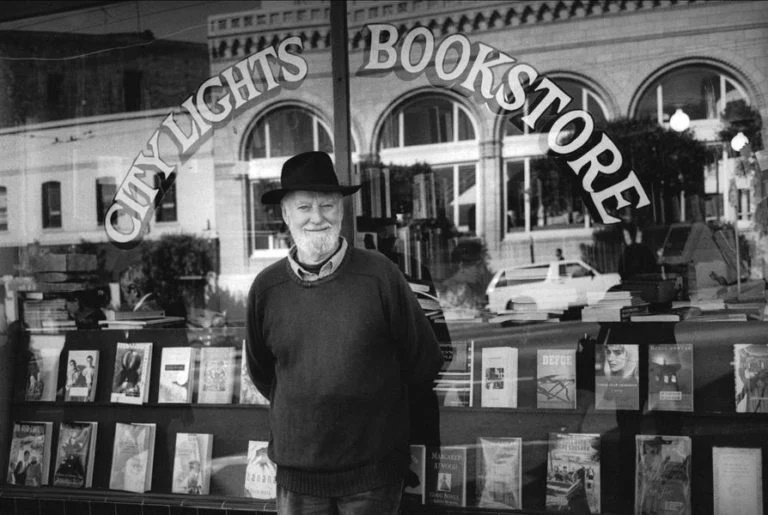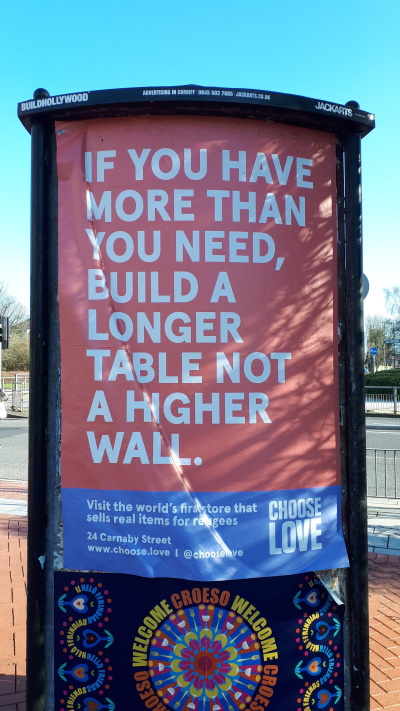 |
110.
Ferlinghetti is Dead
Ferlinghetti is dead. I had no idea he was still alive.
One hundred and one years old, who can feel bad about
how long he lived and all that he accomplished?
I, too, owned a copy of A Coney Island of the Mind,
his first book of poetry. He was an inspiration for my
generation, for young adult minds taking shape during
the 1960s. He made contemporary poetry accessible, was
the gateway drug. So important was this American icon,
that when I was last in San Francisco, in the spring of
2011, I made a pilgrimage to the City Lights Bookstore.
This was Ferlinghetti’s bookstore, launched in 1953.
I was there, again, this week. My friend Karen, who
lives in San Francisco, had wandered over to the City
Lights Bookstore on Tuesday evening, 23rd February, the
day after Ferlinghetti died. A small crowd had gathered
on the sidewalk to pay tribute with tales and toasts.
She held up her phone broadcasting the event live and I
was in that phone, next to her, watching and listening
at 3:30 Wednesday morning in Cardiff.
Ferlinghetti would also be a publisher of other poets. I
had several of Allen Ginsberg’s books in Ferlinghetti’s
“Pocket Book Series”, sturdy paperbacks in a squarish
format with black and white covers of stark typography.
These books were sacrificed when I immigrated to Wales,
donated to Classic Books on West Lafayette Street in
Trenton, New Jersey, where, maybe, they will provide
inspiration for others.
I asked my Welsh friends if they had ever heard of
Lawrence Ferlinghetti. None of them had. Steve
recognized the name, particularly when I associated it
to Allen Ginsberg. He then realized he had seen the
obituary in the Guardian. He also said, “I
know the names of more dead poets than living ones.”
Is poetry useful? How can poetry be useful if it isn’t
decipherable? I have friends who don’t care for poetry.
To them, and sometimes to me, it is arcane esoterica.
Some poetry is like Rorschach Tests; to be enjoyed, it
depends on what the reader can bring to it. Still, while
my Welsh friends don't make a practice of reading
poetry, they resort to reciting poetry in the form of
song lyrics to express what they are feeling.
This is how I imagine the nascence of poetry, that at
the dawn of language, words were first recorded by being
put to music. Music mysteriously is a fantastic mnemonic
device. It preserved histories and passions in an oral
recitation called forth by plucked strings. From its
inception, poetry was prose put to music and can still
remain so to this day. Perhaps, written language
liberated poetry from the need for music, but not from
the desire to preserve the association.
Furthermore, it had me thinking, if you have the time to
spare, write poetry and embellish existence. Poetry done
right catches our attention, compels curiosity, gets
carved into memory.
When was the last time I read a poem? It was yesterday.
Weeks of chilling rain and bitter dampness gave way to a
warm and sunny afternoon. I took a walk down to the bay.
My route took me past a poster for Choose Love,
an organization trying to raise money to support
refugees around the world. In large block letters of
white against a pale red background, it read: “If you
have more than you need, build a longer table not a
higher wall.” I regarded it and thought, good metaphors,
concisely expressed.

![]()
Mr Bentzman will continue to report here regularly about
the events and concerns of his life. If you've any
comments or suggestions, he would be pleased
to hear from you.
You can find his
several books at www.Bentzman.com.
Enshrined
Inside Me, his second collection of
essays, is now available to purchase.
